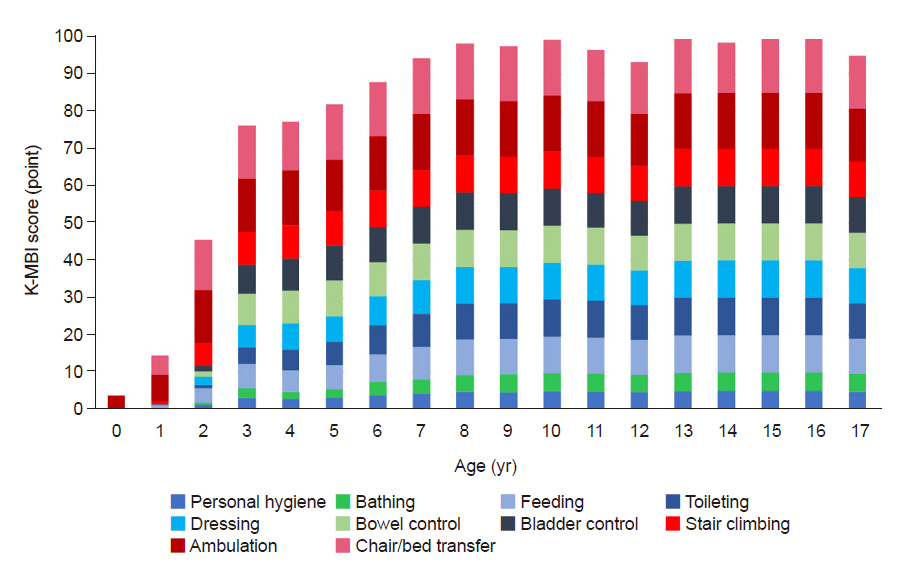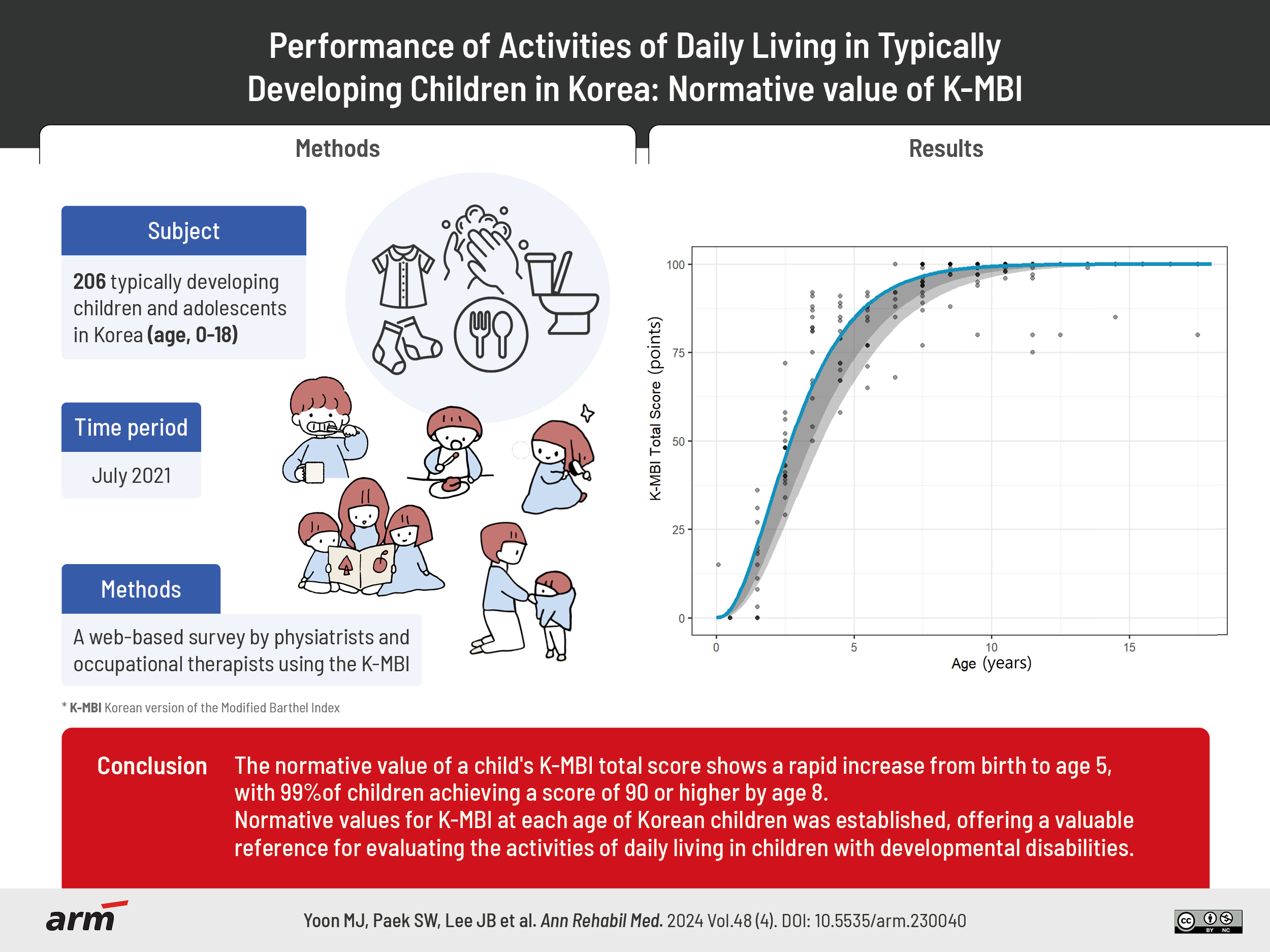Ann Rehabil Med.
2024 Aug;48(4):281-288. 10.5535/arm.230040.
Performance of Activities of Daily Living in Typically Developing Children in Korea: Normative Value of K-MBI
- Affiliations
-
- 1Department of Rehabilitation Medicine, St. Vincent’s Hospital, College of Medicine, The Catholic University of Korea, Seoul, Korea
- 2Department of Rehabilitation Medicine, Ajou Rehabilitation Clinic, Ulsan, Korea
- 3Paul H. Chook Department of Information Systems and Statistics, Baruch College, City University of New York, New York, NY, USA
- KMID: 2558734
- DOI: http://doi.org/10.5535/arm.230040
Abstract
Objective
To determine the normative values of the Korean version of the Modified Barthel Index (K-MBI) score for typically developing children in Korea and assess its suitability for use in children.
Methods
Rehabilitation physicians and occupational therapists with children were invited through an online platform to participate in a survey assessing their children’s performance of activity of daily living (ADL) using the K-MBI. The questionnaire encompassed queries on sociodemographic information of children and the assessment criteria outlined in the K-MBI. The standardized K-MBI scores by age were estimated using the nonlinear least squares method.
Results
The analysis incorporated responses from a total of 206 individuals. K-MBI total scores showed a rapid increase over the first 8 years of life, with 99% of children achieving a score of 90 or higher by age 8. Mobility scores exhibited a swift increase during early childhood, surpassing 90% of the maximum score at 3 years of age and nearing 100% at 7 years of age. In contrast, self-care scores demonstrated a more gradual advancement, achieving approximately 100% of the maximum score by the age of 10 years.
Conclusion
Age-specific normative values for K-MBI scores of typically developing children were established, which can be used as a reference in clinical care. While the K-MBI captured the overall trajectory of children’s ADL development, it did not discern subtle differences across various developmental stages. There is a need for the development of more refined assessment tools tailored specifically to children.
Keyword
Figure
Reference
-
1. Mlinac ME, Feng MC. Assessment of activities of daily living, self-care, and independence. Arch Clin Neuropsychol. 2016; 31:506–16.
Article2. Kang MG, Kim OS, Hoogendijk EO, Jung HW. Trends in frailty prevalence among older adults in Korea: a nationwide study from 2008 to 2020. J Korean Med Sci. 2023; 38:e157.
Article3. Mayer RS, Engle J. Rehabilitation of individuals with cancer. Ann Rehabil Med. 2022; 46:60–70.
Article4. Uchida K, Uchiyama Y, Domen K, Koyama T. Outcome prediction for patients with ischemic stroke in acute care: new three-level model by eating and bladder functions. Ann Rehabil Med. 2021; 45:215–23.
Article5. Brock KA, Goldie PA, Greenwood KM. Evaluating the effectiveness of stroke rehabilitation: choosing a discriminative measure. Arch Phys Med Rehabil. 2002; 83:92–9.
Article6. Ottenbacher KJ, Hsu Y, Granger CV, Fiedler RC. The reliability of the functional independence measure: a quantitative review. Arch Phys Med Rehabil. 1996; 77:1226–32.
Article7. Lee SY, Kim DY, Sohn MK, Lee J, Lee SG, Shin YI, et al. Determining the cut-off score for the modified Barthel Index and the modified Rankin Scale for assessment of functional independence and residual disability after stroke. PLoS One. 2020; 15:e0226324.
Article8. Jeong BL, Yoo EY, Jung MY, Chung BI. Adaptation of the Korean-translated version of the Pediatric Evaluation of Disability Inventory and cross-cultural research: preliminary study. Korean J Occup Ther. 2009; 17:121–32.9. Nair KP, Vasanth A, Gourie-Devi M, Taly AB, Rao S, Gayathri N, et al. Disabilities in children with Duchenne muscular dystrophy: a profile. J Rehabil Med. 2001; 33:147–9.
Article10. Jalali R, Dutta D, Kamble R, Gupta T, Munshi A, Sarin R, et al. Prospective assessment of activities of daily living using modified Barthel’s Index in children and young adults with low-grade gliomas treated with stereotactic conformal radiotherapy. J Neurooncol. 2008; 90:321–8.
Article11. Shah S, Vanclay F, Cooper B. Improving the sensitivity of the Barthel Index for stroke rehabilitation. J Clin Epidemiol. 1989; 42:703–9.
Article12. Jung HY, Park BK, Shin HS, Kang YK, Pyun SB, Paik NJ, et al. Development of the Korean Version of Modified Barthel Index (K-MBI): multi-center study for subjects with stroke. J Korean Acad Rehabil Med. 2007; 31:283–97.13. James S, Ziviani J, Boyd R. A systematic review of activities of daily living measures for children and adolescents with cerebral palsy. Dev Med Child Neurol. 2014; 56:233–44.
Article14. Lim Y, Pritchard KT, Nam S, Hong I. Psychometric properties of the Modified Barthel Index for children with rare disorders. Korean J Occup Ther. 2020; 28:111–20.
Article15. Hyun SE, Kwon JY, Hong BY, Yoon JA, Choi JY, Hong J, et al. Early neurodevelopmental assessments of neonates discharged from the neonatal intensive care unit: a physiatrist’s perspective. Ann Rehabil Med. 2023; 47:147–61.
Article16. Fricke J, Unsworth CA. Inter-rater reliability of the original and modified Barthel Index, and a comparison with the Functional Independence Measure. Aust Occup Ther J. 1997; 44:22–9.
Article
- Full Text Links
- Actions
-
Cited
- CITED
-
- Close
- Share
- Similar articles
-
- Relationship Between Grip and Pinch Strength and Activities of Daily Living in Stroke Patients
- Korea Activities of Daily Living Scale and Korea Instrumental Activities of Daily Living Scale
- Effects of Respiratory Muscle Training on the Respiratory Function, Balance, and Activities of Daily Living in Patients with Stroke
- Efficacy of Mirror Therapy Containing Functional Tasks in Poststroke Patients
- The Relationship Between Initial Trunk Performances and Functional Prognosis in Patients With Stroke





